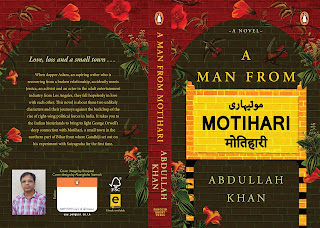In search of his identity
A Man From Motihari.
You will not be far off the mark, if this title reminds you of George Orwell. Eric Arthur Blair, the noted English novelist better known as George Orwell, was born in Motihari. And so was Aslam Sher Khan, the protagonist of A Man From Motihari. The connection doesn't end here...Aslam was delivered in the same bungalow where Orwell was born; Aslam's delivery was aided by a midwife, who was Orwell's nanny. This 'Lady in White' has constant presence in Aslam's life, something like a talisman.
But no, this is not a novel redolent of ghosts stories. Or shall we say it, A Man From Motihari is not the conventional ghost story. Instead its author Abdullah Khan touches upon the 'ghosts' of Babri Masjid, Godhra riots, bomb blasts in Varanasi, the agitation against Citizenship Amendment Act, all seen through the eyes of Aslam Sher Khan, a banker and an aspiring writer from small town India.
Khan has deftly woven the past and present of our socio-political fabric and forces us to think on our choices, friendship, patriotism and eventually our identity as a nation. There is no suspense, no smoke screen, but plain speaking which pinches us, when we step into the protagonist's shoes for a moment.
Interestingly, the author measures Aslam through the eyes of his women characters - Aslam's wife Heba, his daughter Kainat, his Bhabhi and his friendship turning into love for Jessica. We see Aslam rise, falter and then rise again, allowing the readers to explore his world, free from blinkers. A rare gift that has to be treasured.
Name: A Man From Motihari
Author: Abdullah Khan
Pages: 332
Publisher: Penguin Random House India
----------
Abdullah Khan tells us more about A Man From Motihari
Do you
think A Man from Motihari mirrors your struggle when you wrote your first book,
Patna Blues?
Not exactly. But, to a great extent Asalm’s
struggles to get published is similar to mine. However, I have given
dramatic twists to certain incidents.
In A Man from Motihari you went a little deep, interpreting the various sects of Islam for the layman. Tell us more about it.
No story exists in a vacuum and the characters are expected to be impacted by the socio-cultural and political changes taking place around them. Hence, I decided to include the details about the existing faultlines within Muslim society, in addition to depicting the contemporary political situation in the country.
You have been away from the small town life for a while now. How do you ensure that when you are looking back – through the setting of your novels – that you are being objective and not nostalgic?
I spent the first 25 years of my life in small towns and villages, and later for almost a decade, as an officer of a public sector bank, I kept traveling from one small town to another small town across the country. I am currently based in Mumbai, but I visit my hometown at least once a year. Thus, I am still connected with my roots.
How was it to see/write your character through the eyes of women – the midwife, Aslam’s mother, Heba and Jessica?
Initially, I was scared and didn’t know how to handle it. But, then, one well known Kenyan writer gave valuable tips and assured me that I need not worry too much. According to her, the writing process for a male character and a female character are not different. After all, both are human beings. Plus, my wife, Tarannum, is always there to share her feedback on the manuscript and especially on female characters. Wherever Tarannum felt I was going wrong, I made changes.
Which of George Orwell’s works resonates with you the most? And, what would he think about your book?
I loved all his novels and non-fiction works. But,
my most favourites are Burmese Days and Animal Farm in the fiction category.
Among non-fiction, I liked Homage is Catalonia, Orwell’s account of the
Spanish civil war, the most. I believe that Orwell would have liked my attempt
to address the issue of identities and marginalisation through my novels.
Finally, did Covid have a role to play in the writing of this novel? How did you deal with it?
During the pandemic, I was too disturbed to write
anything significant. A couple of tragedies in my family kept me preoccupied
mentally and I could not write much. This novel was written in 2021 and I took
less than eight months to finish it.





Comments
Post a Comment